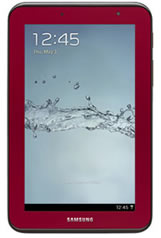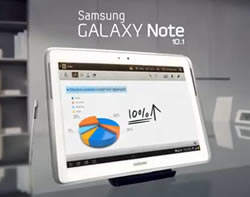Difference between Samsung Galaxy Tab 2 7.0 and Galaxy Note 10.1
Key Difference: The Samsung Tab 2 7.0 is a 7-inch tablet that offers a PLS TFT LCD display, with approximately 170 ppi density. The device is also available in two versions; Wi-Fi only and Wi-Fi + 4G. The Wi-Fi only tablet is powered by a 1 GHz Dual-core processor and is available with the Android v4.0 Ice Cream Sandwich, while the Wi-Fi + 4G LTE tablet is powered by a 1.2 GHz Dual-core processor and comes with Android v4.1 Jelly Bean. The Galaxy Note 10.1 is a tablet computer designed and manufactured by Samsung. It features a 10.1-inch screen and is marketed as a platform for multimedia consumption including movies, music, and web browsing. The Note 10.1 also features the use of a stylus named the S-Pen. The Note 10.1 runs on Android 4.0.
 Samsung Galaxy Tab 2 7.0 is a major upgrade to the company’s original Samsung Galaxy Tab. The tab shares many features to its big brother The Galaxy Tab and the Galaxy Tab 7.0 Plus. The tab is actually a downgrade compared to the Galaxy 7.0 Plus, including the price of the tablet. However, during the launch it was also the only Tablet on the market at that time which served the Android Ice Cream Sandwich right out of the box. The device is also available in two versions; Wi-Fi only and Wi-Fi + 4G. Both the devices differ in a few areas so, when purchasing either device, make sure to once look over the various different features that are offered in the Wi-Fi + 4G, which are missing the Wi-Fi only model.
Samsung Galaxy Tab 2 7.0 is a major upgrade to the company’s original Samsung Galaxy Tab. The tab shares many features to its big brother The Galaxy Tab and the Galaxy Tab 7.0 Plus. The tab is actually a downgrade compared to the Galaxy 7.0 Plus, including the price of the tablet. However, during the launch it was also the only Tablet on the market at that time which served the Android Ice Cream Sandwich right out of the box. The device is also available in two versions; Wi-Fi only and Wi-Fi + 4G. Both the devices differ in a few areas so, when purchasing either device, make sure to once look over the various different features that are offered in the Wi-Fi + 4G, which are missing the Wi-Fi only model.
Both the models offer similar dimensions and major features, with the differences being only with the processor speed, OS, camera features and colors. The Samsung Tab 2 7.0 is a 7-inch tablet that offers a PLS TFT LCD display, with approximately 170 ppi density. The Plane to Line Switching (PLS) differs from the IPS technology of the other tablets and while it provides decent wide viewing angles, it still has a high propensity for reflecting surfaces. The display also lags compared to the other IPS displays with higher resolutions. The tablet is small and sleek compared to the other 7-inch devices making it lighter and easier to hold. The device has a sturdy design and has an all-grey plastic back. It has a thick bezel with a light grey screen. The device houses the power button, the volume button and the IR-port on the right side of the device, the microSD card slot is placed on the left side covered by a plastic flap. The 3.5mm jack is on top of the device and docking port is at the bottom.
The Wi-Fi only tablet is powered by a 1 GHz Dual-core processor and is available with the Android v4.0 Ice Cream Sandwich, while the Wi-Fi + 4G LTE tablet is powered by a 1.2 GHz Dual-core processor and comes with Android v4.1 Jelly Bean. Both devices offer 1 GB RAM and are available with 8/16/32 GB internal storage capacity that is expandable by 32 GB. The tablets house a 3.15 MP rear camera and a VGA front camera for video conferencing. The VGA camera is a downgrade from the 2 MP offered on Galaxy Tab 7.0 Plus. The camera also comes with a Flash that is placed under the camera on the back of the device. The 4 LTE tablets also come with additional camera features such as: Smile Shot, Geo-tagging, Editing Modes, Camcorder, DivX, HD Recording, HD Playback, Video Share and Online Image Uploading.
Both the devices sport IR blasters, which allow the tablet to be used as a fully-functioning remote control. The device houses a non-removable Lithium-ion 4,000 mAh that provides a lasts a good amount of time on the Wi-Fi as well as the 4G network. The device is available in black and white on the Wi-Fi + 4 LTE, while an additional Garnet Red color has been added to the line for the Wi-Fi only tablet. Both the models come with various built in Samsung Applications and have been approved for Enterprise by the Company, something known as SAFE (Samsung Approved for Enterprise). This includes an array of business applications such as: Microsoft® Exchange ActiveSync, Virtual Private Network (VPN) Access, Polaris® Office, Video Chat, Cisco WebEx, EAS IT Policy, HW Encryption and Sybase Afaria. However, it lacks in terms of tablet based applications in Google Play. Well, that is not exactly Samsung’s fault but it is one of things that have been keeping pushing sales of Apple tablets more than Android Tablets. Google Play has not been able to offer enough applications that support the tablet format. This problem should only be temporary as the demand for tablets is on the rise in the market.
 An OEM which also had Android based devices in the market is Samsung. Samsung Group is a South Korean chaebol, the largest in South Korea. A chaebol is basically a conglomerate. Samsung has been launching popular phones and tablets, which have taken the market by a storm. Samsung Galaxy series has been one of the most popular series on the market and has been going head to head with the trend-setting Apple phones. One of the popular tablets launched by the company is the Samsung’s Galaxy Note 10.1.
An OEM which also had Android based devices in the market is Samsung. Samsung Group is a South Korean chaebol, the largest in South Korea. A chaebol is basically a conglomerate. Samsung has been launching popular phones and tablets, which have taken the market by a storm. Samsung Galaxy series has been one of the most popular series on the market and has been going head to head with the trend-setting Apple phones. One of the popular tablets launched by the company is the Samsung’s Galaxy Note 10.1.
The Galaxy Note 10.1 is a tablet computer designed and manufactured by Samsung. It features a 10.1-inch screen and is marketed as a platform for multimedia consumption including movies, music, and web browsing. The Note 10.1 also features the use of a stylus named the S-Pen. The stylus is meant to be used as an input device for sketching and note-taking. The Note 10.1 runs on Android 4.0. The stylus and the tablet work seamlessly together and also have a palm rejection software. The palm rejection software makes sure to reject any other body parts when the stylus is connected to the screen, enabling people to place their hand on the tablet as they write. Another new feature that was launched with the tablet was the Multiscreen option. The multiscreen feature allows the user to open and work on two apps simultaneously. However, it is currently limited to only six apps (S Note, Polaris Office, Video Player, gallery, Email, and the Android 4.0 browser) that can be opened side-by-side.
The Note 10.1 is available with 16 GB, 32 GB and 64 GB storage capacity. The models are further bifurcated under Wi-Fi only, Wi-Fi and 3G, as well as Wi-Fi, 3G and LTE. The tablet houses1.4 GHz Quad-core Cortex-A9 processor with 2 GB RAM, working seamlessly without any lag. The Note 10.1 offers 5 MP autofocus rear camera and a 1.9 MP front camera for video calling. The tablet also houses a powerful 7000 mAh battery that can provide a talk time of approximately 33 hours. It also offers a variety of features including IR Blaster, which allows the tablet to become into a fully-functional remote control. It works with Peel’s Smart Remote app that also displays a list of shows or movies that are currently playing on the local provider’s channels.
The information for the detailed table about the two phones has been taken from the Samsung website, pcmag.com, engadget.com, and GSMArena.com.
|
|
Samsung Galaxy Tab 2 7.0 |
Galaxy Note 10.1 |
|
Launch Date |
April 2012 |
August 2012 |
|
Company |
Samsung |
Samsung Corporation |
|
Size |
193.7 x 122.4 x 10.5 mm |
262 x 180 x 8.9 mm (10.31 x 7.09 x 0.35 in) |
|
Display |
7.0 in (18 cm) PLS TFT LCD display |
PLS TFT capacitive touchscreen, 16M colors |
|
Screen |
1024 × 600 pixels (~170 ppi pixel density) |
800 x 1280 pixels, 10.1 inches (~149 ppi pixel density) |
|
Protection |
N/A |
- |
|
Weight |
345 grams |
3G model: 600g Wi-Fi: 597g |
|
2G Network |
GSM 850 / 900 / 1800 / 1900 |
GSM 850 / 900 / 1800 / 1900 |
|
3G Network |
HSDPA 900 / 2100 - GT-P3100 HSDPA 850 / 900 / 1900 / 2100 - GT-P3105 |
HSDPA 850 / 900 / 1900 / 2100 |
|
4G Network |
Depends on market capability |
LTE 1800/ 2600MHz) and 3.5G (HSPA+ 42.2Mbps) |
|
GUI |
TouchWiz UX UI |
Samsung TouchWiz UI |
|
CPU speed |
1 GHz Dual-core processor/ 1.2 GHz Dual-core Qualcomm processor (4G) |
Quad-core 1.4 GHz Cortex-A9 |
|
GPU |
PowerVR SGX540 |
Mali-400MP |
|
OS |
Android OS v4.0.3 (Ice Cream Sandwich), upgradable to v4.1.1 (Jelly Bean) |
Android OS, v4.0.3 (Ice Cream Sandwich), upgradable to v4.1 (Jelly Bean) |
|
Chipset |
TI OMAP 4430 |
Exynos 4412 |
|
RAM |
1 GB RAM |
2 GB RAM |
|
SIM Size |
mini-SIM |
miniSIM |
|
Internal Memory |
8/16/32 GB |
16/32/64 GB |
|
Expandable Memory |
Up to 32GB |
Up to 64 GB |
|
Sensors |
Accelerometer, digital compass, light and proximity |
Accelerometer, gyro, compass |
|
Connectivity |
2G, 3G, 4G, Bluetooth technology v3.0, USB 2.0 Host, Wi-Fi 802.11 a/b/g/n, DLNA and Wi-Fi Direct |
Bluetooth technology v 4.0 (Apt-X Codec support) AllShare Play / AllShare Cast Kies / Samsung Kies air USB 2.0 Host, Samsung Wi-Fi 802.11 a/b/g/n (2.4 & 5 GHz), Wi-Fi Direct Wi-Fi Channel Bonding |
|
Data |
GPRS, EDGE, WLAN, Bluetooth, USB |
WiFi, GPRS, EDGE, USB, LTE |
|
Speed |
HSPA+ 21Mbps 850/ 900/ 1900/ 2100 |
HSDPA, 21 Mbps; HSUPA, 5.76 Mbps |
|
WLAN |
Wi-Fi 802.11 a/b/g/n, DLNA, Wi-Fi Direct, dual-band, Wi-Fi hotspot |
Wi-Fi 802.11 a/b/g/n, Wi-Fi Direct, dual-band, Wi-Fi hotspot |
|
Bluetooth |
Bluetooth v3.0 with A2DP, HS |
Bluetooth v4.0 with A2DP |
|
USB |
USB v2.0, USB On-the-go |
USB v2.0 (MHL), USB Host |
|
Primary Camera |
3.15 MP, 2048x1536 pixels |
5 MP, 2592х1944 pixels, autofocus, LED flash |
|
Secondary Camera |
VGA |
1.9 MP |
|
Video |
Full HD @30fps |
720p@30fps |
|
Camera Features |
|
|
|
Sound Enhancement |
SoundAlive |
No |
|
Audio supported formats |
MP3, AAC, AC-3, AMR, FLAC, MID, WMA, WAV, OGG |
MP3/WAV/eAAC+/Flac player |
|
Video supported formats |
3GP, ASF, AVI, MP4, WMV, FLV, MKV, WebM |
MP4/DivX/Xvid/FLV/MKV/H.264/H.263 player |
|
Battery Capacity |
Non-removable Lithium-ion 4,000 mAh |
Non-removable Li-Ion 7000 mAh battery |
|
Talktime |
2G: 40 hours 3G: 20 hours |
2G: 33 hours |
|
Standby Time |
2G: 1190 hours 3G: 1080 hours |
2G: 1500 hours |
|
Available Colors |
Black, White, Red |
Black, White/Silver |
|
Messaging |
SMS(threaded view), MMS, Email, Push Email, IM, RSS |
SMS(threaded view), MMS, Email, Push Email, IM |
|
Browser |
HTML5, Adobe Flash |
HTML, Adobe Flash |
|
Radio |
No |
No |
|
GPS |
A-GPS support and GLONASS |
Yes, with A-GPS support; GLONASS |
|
Java |
Java via Java MIDP emulator |
Java MIDP emulator |
|
Additional Features |
|
|
Images Courtesy: samsung.com









Add new comment